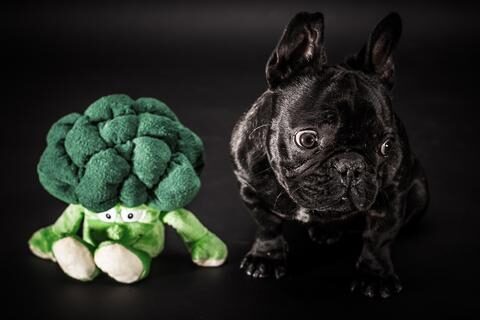Is your French bulldog continually scratching, biting, and licking his fur? Does his skin look red and irritated? Well, these symptoms are definitely the reason to be concerned. That’s why I want to help every Frenchie owner to know how to make a difference between food intolerance and allergy in his dog.
We all agree that allergies aren’t fun for anyone. They make us nervous and moody. Now, imagine your dog’s going through pains, and he’s unable to explain to you what’s making him sick. On the other hand, food intolerance might sound like an easier form a suffer but it’s not like that.
What causes allergies and food intolerance in French bulldogs?
There are two types of allergies– food and environmental, and when we talk about food type, it may take several years before a pooch develops symptoms. Your dog can be on a specific diet from an early age, and then to suddenly react to some ingredient. Symptoms of allergies are usually associated with protein sources and by-products. They present the response of your Frenchie’s immune system to an invalid protein. People often don’t know that proteins are found not only in meat but also in different grains and veggies.

Since Frenchies are also prone to suffer from flatulence and gasses, you need to be especially careful when choosing the ingredients for their menu.
When we talk about food intolerance, there is one main difference. It is the result of poor digestion, and the most common ingredients that cause food intolerance are dairy products. The enzyme lactase found in milk can make a dog have diarrhea. Unlike a food allergy, intolerance is usually not a life-threating condition but frequent diarrhea may lead to weight loss and weak growth.

What ingredients to avoid when choosing a diet for a French bulldog?
The food your Frenchie eats should be well-balanced and to contain as few additives as possible. By-products such as chicken skin, legs, kidneys, and other clean non-rendered parts other than meat can trigger an allergy. Therefore, my advice is to carefully read the label on the food you’re buying for your little gremlin.
Artificial ingredients should also be avoided because they are often the biggest culprit for your dog’s itchy skin. Itchiness may happen anywhere- on a dog’s ears, paws or belly. As a result, a dog may develop bloody wounds and bald patches that become susceptible to infections.

What are the symptoms of food allergy in French bulldogs?
It should be noted that it could be very difficult to diagnose a food allergy in your Frenchie. It’s because people often mix it with the environmental type of allergy.
In most cases, a dog usually shows itchiness and gastrointestinal issues such as runny stools and vomiting. Another important factor to consider is the appearance of your dog’s coat. Does it look dull and shineless? Have your Frenchie started to lose hair in patches and developed red spots? If the answer is yes, then you can be pretty sure your furry friend doesn’t feel well when eats specific ingredients.

How to solve a food allergy in French bulldogs?
If you have noticed any of the previously mentioned signs, I advise you to talk to your vet to prescribe you the elimination diet. It consists of only one source of protein that will help you to identify the trigger.
If you feed your pooch with a homemade diet, then you can make a list of ingredients your dog eats. In case when you feed your little gremlin with commercial food, the first step you need to do is to switch to BARF diet for French bulldogs.
In that way, you can control the ingredients your dog eats and to easier discover the main culprit of his suffering. According to the opinions of hundreds of French bulldog owners, this type of diet has shown as the best for their dogs. Besides your dog will be able to eat the food without artificial ingredients and by-products, you’ll also succeed to boost your Frenchie’s immune system.

